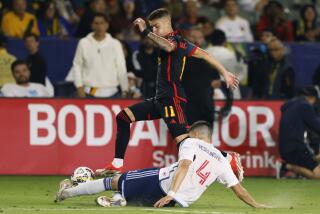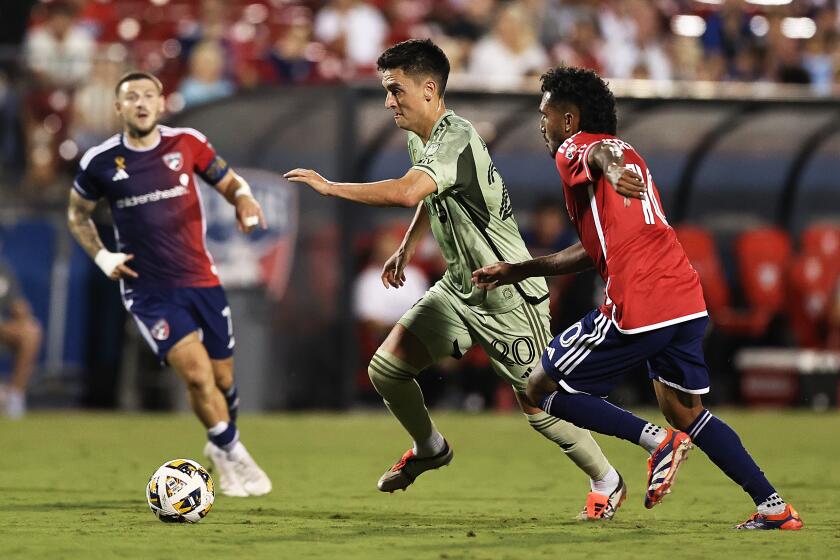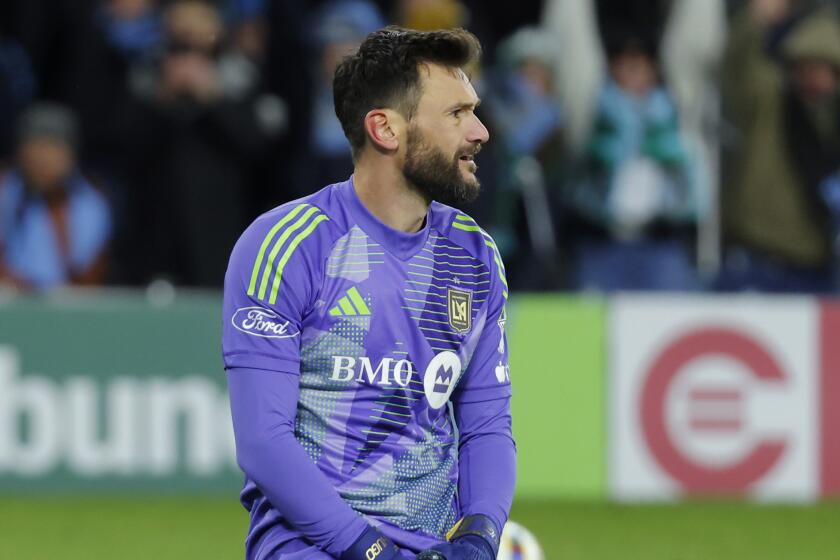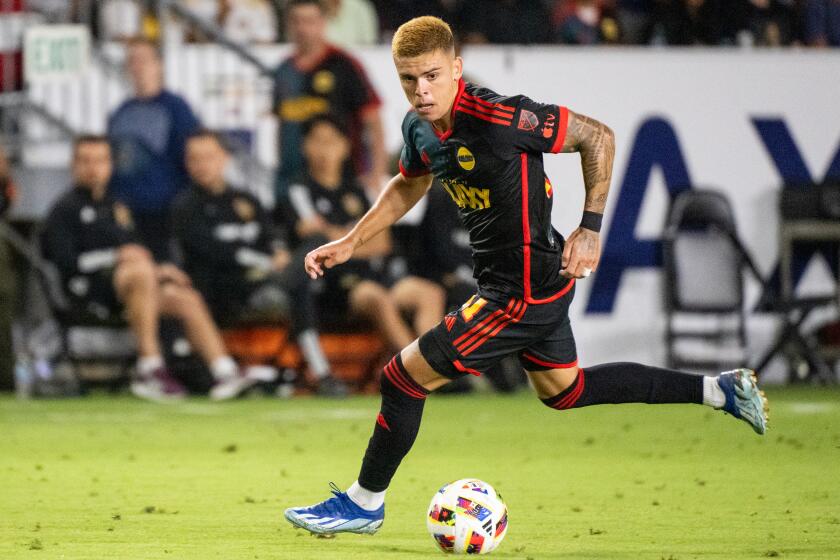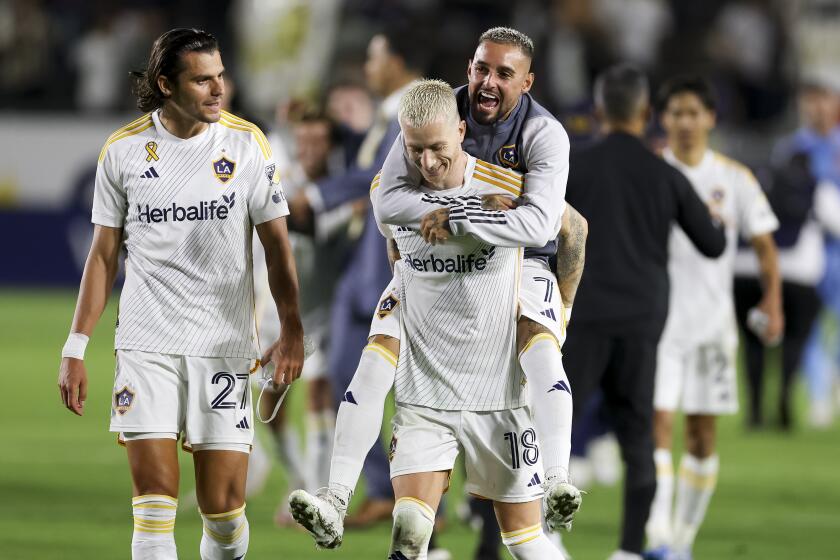Another two Americans are sold on British soccer
The very idea of Americans buying English Premier League soccer clubs, once unheard of, if not unthinkable, has become fashionable enough to seem almost mundane.
George Gillett and Tom Hicks’ purchase Tuesday of the venerable Liverpool team for $340 million makes it three American purchases in three years, what with Manchester United in 2005, Aston Villa in 2006 and now Liverpool.
The sale of Manchester United to the Glazer family of the NFL’s Tampa Bay Buccaneers roused such ruckus that “Love United/Hate Glazer” decals still adorn lampposts near the stadium. That sale entailed a heap of debt, and the spite sprouted partly from fears of how that might hamper future player acquisitions, although being in first place through this season has quelled that somewhat.
The sale of the Birmingham-based Aston Villa to Randy Lerner of the NFL’s Cleveland Browns proved more tranquil, partly because of fan fatigue with his octogenarian predecessor.
And the sale of Liverpool, the most successful club in the history of England’s beyond-beloved game, to the owners of the NHL’s Montreal Canadiens (Gillett) and baseball’s Texas Rangers and the NHL’s Dallas Stars (Hicks)? That wrought a few odd groans about Gillett’s early-1990s bankruptcy or Hicks’ support of President Bush, but those comments pretty much drowned in the comprehension of globalization’s reality.
Globalization’s ultimate sports league saw its foreign-ownership total hike to seven, or 11 if you count foreign-company ownership, according to the BBC. The Premier League includes owners from Egypt (Mohamed Fayed, owner of Harrods department store), Iceland and two from Russia. Roman Abramovich, the Russian billionaire, has spent so profusely on player salaries that it’s common parlance to follow “Chelsea” with “They bought their championships.” (Two in a row, for the record.)
Clearly, curious billionaires can expect stout challenge for a league deemed the world’s most popular in sports and televised in 196 countries with a new overseas TV deal worth $1.225 billion.
For several months, it had seemed apparent that Liverpool would go to the world’s fifth-richest person, sheik Mohammed bin Rashid Maktoum of Dubai.
That hit a snag, and today, Americans own three of the 20 top-flight clubs, and while each May three clubs suffer relegation to the second tier, none of these three figures to plummet any year soon.
In a league that routinely draws complaints for its predictability, four clubs tend to float to the top of the standings across the winter: Manchester United, Chelsea, Liverpool and Arsenal. They form their own de facto glamour division, and Americans own half of them.
“This is truly the largest sport in the world, and this is the most important club in the most important sport in the world,” Gillett said at a news conference.
His presence alongside Hicks epitomized the drastic departure from the days of local ownership. From Liverpool’s formation in 1892 through its first century or so, it surely never imagined ownership by a Coloradan voted to the Colorado Ski and Snowboard Hall of Fame and the owner of, among other things, the Mesquite Championship Rodeo.
In the Premier League, which has 340 foreign players, it’s ever more about a borderless globe. One media debate last spring focused on Arsenal, the North London club with no prominent British on its roster at the time.
Arsenal’s 2006-07 roster includes 24 foreign players and its marketing tentacles reach around the globe, much like those of Manchester United and Chelsea.
Yet, Liverpool, even with its league-record 18 championships, its five European Championships (third behind Spain’s Real Madrid and Italy’s AC Milan), and its seven FA Cup championships (a year-long English tournament that runs concurrently with the league schedule), comes up shy of the other bigwigs in the global-cachet division.
Liverpool would seem to have ample potential for catching up. Among English fans who seethe from underneath the big four, it often draws praise as the most likable brute. Until the team gets its planned new stadium, it plays at Anfield, probably the nation’s most hallowed ground.
Since the 1960s, Liverpool fans have resuscitated “You’ll Never Walk Alone,” the Rodgers and Hammerstein tune from the 1945 Broadway musical “Carousel.” They sing it to the players throughout games. The song title is painted on their stadium and carved to the lattice work of the stadium gates.
The stadium sits in a gritty, authentic neighborhood that echoes the past, now with American owners that promise the future.
